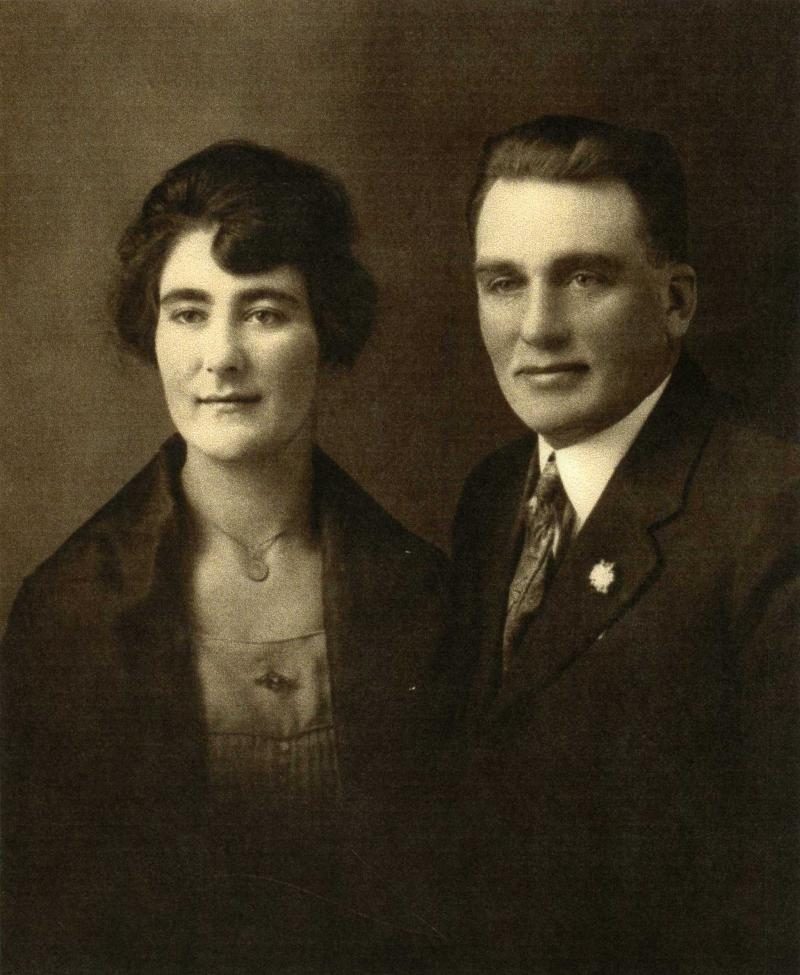Emily Veigel Tolman
Contributed By Kelly Tolman at her funeral service on 22 April 1989
The smell and sound of spring was in the air on that April day in 1895. The farm was a burst of energy as new calves and lambs romped playfully across the rapidly greening pasture. Spring-green blades of grass were pushing through the soil and winter barren trees were bulging with anxious buds.
Nearby, in a small two-room log house with a dirt roof, a young German father humbly knelt near the side of a bed and gently touched the velvet skin of a newborn baby girl. This new arrival lay cradled in the arms of of a joyful mother with a beautiful new daughter, living in the wilds of Wyoming so distant from her homeland of Switzerland. A hungry cry from the babe and her husband’s soft kiss assured her that it was real. While she looked into the blue eyes of her husband, a tenderness of love encircled the room and sealed a bond that would carry this new little girl through the trials and joys of an earthly existence.
Her name was Emily, and she grew quickly from that 10th day of April, 189 5. To her parents, Charles Viegel and Ida Leuenberger, she was a joy as they watched her grow from infancy to a young girl full of patience, perseverance, and pride. They had fun listening to those first German words and sending Emily across the floor with a wobbly walk into each other’s outstretched arms.
Charles and Ida were amazed at how rapidly time went by and how quickly Emily was growing up. Soon she was dressing herself for bed and begging Daddy for a bedtime story from the old county. Mornings found her standing on tiptoe by the window in her nightgown, waiting for her daddy to come in for breakfast. Ida took great satisfaction in how easily Emily learned to help around the house. Likewise, Charles was proud of Emily’s interest in the farm and her willingness to help. Two brothers later joined the family, and Emily dearly loved them. To her, Charles and Edgar were her best friends and playmates. Many nights, after the children were in bed, Charles, tired from a hard day of work in the fields, and Ida, equally exhausted from a day as a mother, would stand arm in arm and look at their tiny sleeping family and thank God for their blessings.
One day, in Emily’s fourth year, her father packed a small bag for a trip to Montpelier for provisions. The thought of Daddy being gone for two nights was almost too much for the children. But mother assured them that two nights weren’t really that long (and perhaps Daddy promised them some candy). That night Ida gave her children an extra kiss for Daddy as she tucked them into bed.
The next morning, before the children awoke, Ida went out to do some chore and noticed that the cows were in the stackyard. She quickly headed toward the cows, calling the dog to help her. At the stackyard she noticed that a bull Charles had sold to a neighbor had returned and broken the fence. Wjile Ida was driving the cattle out of the stockyard, the dog began to bite the heels of the bull, causing him to charge. The dog ran to Ida and she became the victim of the charging bull. A neighbor nearby ran to her aid and carried her to the house.
Emily an her brothers, who had been awakened by something, were just getting ready to open the door and where Mother was when Bro. Neilson ran in with their mother in his arms. The injuries were fatal and Ida passed away that night. Charles, who had been contacted by a boy on a fast horse, returned about 4:00 in the morning. Emily said that she remembered hi, coming into the room and talking to her and her brothers. At this point she began to weep and she recalled the tender tears of her father mixing with the tears of his children as they shared the sorrow of having a young mother taken from them so quickly.
For Emily, this was a turning point in her young life. In fact, I dare say that hardly a day went by when Grandma didn’t think about “Mother.” Grandma’s memory of her mother was limited because she was so young when she died . When I was recording her history , she told me,”There’s very little that I remember about Mother. I just remember having her. I remember that she was there. I remember the accident, of course. There’s a few things I think about through life.. I can remember watching her make doughnuts once upon a time.”
With these limited memories fastened to her mind and heart, Emily buckled in to somehow fill the void that was left in their home. Father didn’t talk much about the accident. He kept his heartache personal and so Emily bore her grief in the silent conversations of her young mind. As time went on she was kept busy washing dishes, doing laundry, and cooking meals, She played with her brothers in her spare time. In the summer, when Salt River was low, they would play in the big water holes.
She attended school in Dry Creek and enjoyed the association she had with the other kids, especially the girls. At lunch time she loved to go with the girls to water the horses that pulled the school wagon. They would hop hop on the horses and ride to the ditch and sometimes the school bell would be ringing before they got back. When asked if she pulled any pranks she replied, “Well, I’m afraid not. Not me. I wasn’t mischievous. I was quiet.”
Emily’s social life was somewhat limited because she was needed so badly at hokme and because she and her family did not belong to the church at that time. So she spent a lot of time writing letters, especially to her aunt Bertha Fritz, her mother’s sister. Bertha lived in New York and when she heard of the death of her sister, she extended all of her love she could to her lonely, motherless niece in Wyoming. On each holiday and on each of her birthdays, Emily would receive beautiful postcards from “Aunt Birdie.” Emily never met his beloved aunt. We can only imagine the dreams she may have had of sitting with Aunt Bertha and perhaps imagining what her own mother was like.
The years passed and Emily grew into a beautiful young women. She enjoyed dances, but preferred going to the theater and watching a show. In the summer of 1917 she was at a dance where she met Joseph Tolman. Over the next few months their love for each other grew and they decided to get married. However, Joseph felt they should wait a while because there was chance that he would be called to serve in World War I. In November of 1918, the armistice was signed, and Joseph and Emily were married on 27 November 1918.
Emily’s years of preparation to be a mother were immediately called upon. During the flu epidemic of 1918, a three-year-old boy had been left motherless. His father,who had lost not only his wife but also a young daughter, left this boy with Joseph to care for. So Emily took his this young boy into her home and raised him as her own becuase she had lost a mother, too. She took J.T. Gamble and loved him in her own quiet way.
Emily’s early married life seemed to consist of moving around to the different homestead and having baby boys. Shortly after her marriage, she joined the Church, something she had wanted to do for a long time. Joseph and Emily had five boys, full of energy and life (and, I might add, a by more mischievous than she would admit). Edwin, Alvin, Dallas, Farrell, and Marrener were her boys, and she loved them dearly. When I asked her if she could recall any experiences she had with her sons, she said, “Well, it doesn’t seem like it. I’d get mad at them occasionally. I guess any of us do. But I usually put up with the noise. Sometimes they had to be quiet when Oz was around. That was all right. But when he wasn’t around I’d turn ’em loose and they’d have all the fun they wanted. There was one thing I didn’t like. It seemed that every year in the spring, Oz would plow out the dooryard like he was going to plant lawn, but then he wouldn’t plant lawn. And that’s where the kids wanted to play… in that dirt! That used to get me out of sorts. And they had a good time too! They’d play football and knock each other around and down in that soft dirt. ‘Course the kids would get dirty quick. Well, though, it seems like those things you forget.” That’s Grandma.
Well, her boys all grew up and married and the grandkids started coming. In 1958, Joseph died and she decided to stay with her son Ed in Logan. From this base camp, Emily spread her love from Utah to Wyoming taking turns staying with her sons. As we look back now, perhaps we can understand why she never desired to have a place of her own. In her mind and heart, she belonged to her family and they to her. She was, first of all, a mother to whom her sons could look for love and help in their homes. Second of all, she was a grandmother who made sure her grandkids knew who she was through birthday letters and $2 checks. Being a mother an grandmother were the most precious things to her in the world, and she wanted to fulfill those roles the best ways she knew how.
Today we are gathered in a reunion to honor the life and memory of Emily Veigel Tolman. We shed tears together and we are glad that we are a part of her life and she a part os ours. But I believe that last Tuesday, April 18th, there was a reunion whose tears and joys we cannot comprehend. Grandma passed quietly in her own way from this mortal life to be greeted by the outstretched arms of her dear mother and father; dear Aunt Bertha, too, and Grandpa, and her sons, Farrell and Alvin. Indeed, when we think of this grand reunion, we understand better the words of the psalmist who wrote, “Oh death, where is thy sting? Oh grave, where is thy victory?”
With Grandma’s passing we are left with three things.
First, her posterity of surviving sons, grandchildren, great-grandchildren, and great great-grandchildren. To each of them and to each other, we unitedly must give the same kind of love, patience, and understanding that Grandma would want us to give.
Second, we have our memories of her. These must be honorable shared with each other. Her life was a legacy of love and her posterity deserves to know about the life of Emily Veigel Tolman.
Third, we have her example in how to live life correctly. There is a wrong and a right way. She chose the right way, no only for herself, but for the benefit of all her descendants. She chose to follow Christ through activity in his restored Church. She knew that she was on the right path. It is up to us to make sure that we do not mock this example by straying off that path and to her witness of the truth of the Gospel of Jesus Christ.
Visit FamilySearch to learn more about Emily Veigel. Visit the Thomas Tolman Family Organization to find out how you can get more involved in family history.


